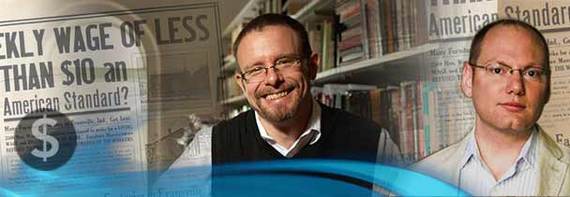Today a senior student dropped by my office hours to chat about the new MOOC on the history of capitalism that my colleague Ed Baptist and I are launching next month.
Around Cornell, there has been a lot of controversy about the MOOCs and whether they are a good use of university resources. Some current students wonder why they pay good money to come here if we are going to give away content for free. This student, Susan, came by to tell me why I needed to keep doing them.
Susan is one of our best students, but she doesn't fit the typical 22-year-old mold of a Cornell senior. She is more like most Americans in higher ed. She is middle-aged. She had a family, she had a job and she struggled to come back to school after years away. The image we often have of college as the inevitable next step after high school just isn't true. More Americans don't go to college than go, and when they go, they go to community college -- not Yale. Many students who begin college -- often going into debt to do so -- never finish. They pay too much for for-profit classes and then they spend years paying back those debts. In all the debates around MOOCs, which are free, somehow these most essential facts are lost.
She had gone intermittently to community college in her hometown of Cleveland, OH. There, she "wasted" a year taking remedial classes in math and writing. "I could have done all of that on Khan Academy and just taken placement tests," she lamented. She wasted time and money -- the two most valuable resources any of us have.
After she discovered Khan Academy as well as the more formal MOOCs, she started to believe in herself and understand what a "course" really was. "MOOCs taught me I could do this," she told me. But to do this meant fitting in classes around a busy life. MOOCs helped her get back in the swing of things on her own time, relearning long-forgotten algebra and grammar from 30 years earlier. She persevered however, and after a stint in Cleveland, transferred to Cornell to complete her B.A. The seminars and lectures here at Cornell were "stimulating" in a way that the online learning was not, but the online learning made Cornell possible.
MOOCS, in her view -- and in a mine -- are an ideal way for Americans who didn't follow the traditional education path to come back to it. Instead of enrolling in a class, going into debt, and then finding one's work schedule has changed, you can take a MOOC on your time and rediscover how to learn. MOOCs need to reach out to non-traditional students. American Capitalism: A History, for instance, will be podcasting all of the lectures, so that working people can listen to it during their commute, at work or even just cooking at night. Education needs to be setup for the real lives of real people.
MOOCs aren't the totality of education, but they can be a way to get back into it. Susan told me that MOOCs taught her the only real skill that one learns in college: "how to teach yourself." The value of colleges like Cornell, then, is in the seminars where you can discuss and debate, that is, not only "how to teach yourself" but to teach others.
Susan is graduating this semester after spending two good years in Ithaca (and some research time in Ukraine). She isn't sure what her next step will be, but she does know that she is now prepared to have a different sort of life than that she had before she returned to school. MOOCs aren't a complete education, but for people who have been left out of the traditional path, that can be part of it. For me, if our free MOOCs keep bring excellent students like Susan to Cornell, then I think the question of whether they are a good use of university resources answers itself
